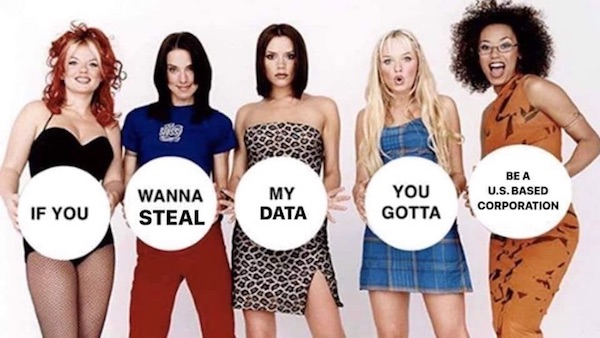Kamala Harris and the ascent of Silicon Valley
By Mark Hurst • August 13, 2020
The biggest news in the tech industry this week came, of all places, from the Biden campaign. Kamala Harris is running for vice president. This must be a relief to the tech oligarchs, since one of their own is now on the ticket. If Biden wins in November, Harris will further cement Big Tech's dominance in Washington.
Born and raised in the Bay Area, Kamala Harris served as attorney general of California for six years before taking office as U.S. Senator in 2017. Of all the presidential candidates last winter, Harris was the most closely aligned with Big Tech. Her presidential campaign enjoyed support from a number of Silicon Valley power brokers:
- Sheryl Sandberg (Facebook)
- Marc Benioff (Salesforce)
- Reid Hoffman (LinkedIn)
- John Doerr (Kleiner Perkins)
- Laurene Powell Jobs (widow of Apple's Steve Jobs)
- Omid Kordestani (Twitter board member)
- Nicole Avant (married to Netflix's Ted Sarandos)
- Mark Pincus (Zynga)
What are the chances that someone funded by Facebook, Salesforce, LinkedIn, Kleiner, Apple, Twitter, Netflix and Zynga money is going to call for any restructuring of their business models?
In fact, Harris has already given Big Tech a pass. In contrast to the members of Congress - both Democrat and Republican - calling for a Big Tech breakup in the hearings two weeks ago (which I covered in some detail), Kamala Harris and Joe Biden have kept quiet on the issue. As the Wall Street Journal put it today: "When pressed on the matter [of breaking up Big Tech] in an interview with the New York Times during her run for president, Ms. Harris deflected and said her first priority in the White House with regard to Big Tech would be to safeguard user privacy, an area Facebook and others have sought to improve."
Ahh, the bid to "safeguard user privacy." Facebook has done such a nice job of it over the years. And Google is trying to change the very definition of the word "privacy." (Here's my 2-minute audio explainer from last year.) Big Tech giants simply have no intention of safeguarding our privacy. Just the opposite: your private data is their lifeblood. Their very survival depends on selling your data - or more accurately, their analysis of your surveilled data - to the market. It's the definition of "surveillance capitalism." (See Shoshana Zuboff's book.) And that doesn't begin to encompass the anti-competitive behavior revealed in the recent hearings (again, here's my coverage).
So now we have a VP candidate, funded by Big Tech, possibly chosen for the very reason that she can generate donations from Silicon Valley. That's not a good sign. By contrast, remember Elizabeth Warren? She made the oligarchs nervous. Zuckerberg called Warren an "existential threat," and Zuck was right. Kamala Harris, on the other hand, shows no sign of upsetting the toxic surveillance-and-control money machine that aided her ascent. (As a counterpoint, Jason Kint points out Harris's sharp questioning of Zuck during April 2018 Senate hearings. But two years later, Sheryl Sandberg is still celebrating Harris - and enjoying record Facebook earnings. Do the math.)
A stronger analysis comes from Teddy Schliefer at Recode: Kamala Harris is the choice Joe Biden needed to win over Silicon Valley. Biden knew exactly who he was picking, and why - despite early Facebook investor Roger McNamee begging Joe Biden to reject Silicon Valley influence.
Some have pointed out that Kamala Harris represents a brilliant advance for the US, as the first Black woman, and the first Indian woman, to be on a major party ticket. I agree. What's more, I think that a Vice President Harris would be even better, as she would represent America's ability to elect more diverse leadership. I support that.
But any considerations of diversity are far, far outweighed by the danger of Big Tech. Biden, in choosing Harris, is increasing Big Tech's already considerable influence in Washington. And that accelerates the decline of democracy itself. Joel Kotkin, in his new book The Coming of Neo-Feudalism, writes:
Technologies that once were widely seen as holding great promise for grassroots democracy have become tools for surveillance and a consolidation of power. A small group of companies - mostly based on the West Coast of the United States - exercise tightening control over the flow of information and the shape of the culture. Our new overlords do not wear chain mail or top hats, but instead direct our future in jeans and hoodies.
A return to medieval feudalism is a real possibility: a tiny group of oligarchs and their "clerisy" enablers control the economy, while the middle class shrinks into subsistence-wage "gig workers." (Listen to my interview with Joel Kotkin a few days ago on Techtonic.) A Vice President Harris will merely grease the wheels for Big Tech to continue steamrolling all of us.
If Joe Biden had wanted diversity, without an alliance with Silicon Valley, he could have chosen my personal favorite VP candidate: Val Demings, Representative for Florida's 10th district. Kamala Harris may have sharp questioning skills from her past as a prosecutor, but did you see Val Demings rip into Google CEO Sundar Pichai? Demings used to be the police chief of Orlando, and she knows how to question someone who's lying. I'm just sorry we won't see Demings, or anyone else outside Big Tech's grasp, on Biden's ticket.
We need to slow Silicon Valley's deadly ascent in Washington, and Kamala Harris won't help.

Until next time,
- Mark Hurst
Subscribe to my email newsletter
Email: mark@creativegood.com
Twitter: @markhurst
Podcast/radio show: techtonic.fm
- - -